Nature’s Advocates for Ecocide Law
Tuesday 22nd April, 17:00
This webinar aims to raise awareness about ecocide law progress while strengthening Y4EL's global youth network. It will showcase youth-led advocacy successes, highlight regional initiatives, and build capacity for future advocacy.
The webinar will emphasize Y4EL's core narrative that "young generations are disproportionately affected by the destruction of our natural world" and that "the escalating crisis of climate change and biodiversity loss will define our lifetimes, yet current legal frameworks fail to hold those responsible for serious environmental damage to account." It will reinforce that "we are all fighting on the same side of this climate war, the side of life, the side of earth" and that youth are not just the future but are "leading the charge" now.
Speakers:
Saoirse Exton
Salsalina Larasati
Mitchelle Peris Mudibo Tendet
Charity Mwabu
Alex Putzer
Mario Galbert
ECOCIDE LAW IN SCOTLAND: What Does It Mean for Jobs,Justice, and the Economy?
29th April, 17:30 - 19:00
In-person at The Caird Hall
Committee Room 1, Dundee
Ecocide - should destroying nature be a crime?
ONLINE: Tuesday 15 April, 6:30pm - 8:00pm
Ecocide is the extensive destruction of ecosystems caused by human activity, leading to significant harm to the environment and wildlife. Is it time to make the destruction of nature a criminal act? Our expert panel will explore the ethical, legal and environmental implications of criminalising ecocide, examining how international law can evolve to protect our planet.
Don't miss this essential conversation on environmental justice and the future of global wildlife. Register to join this free panel discussion.
Ecocide Law: Catalysing Positive Change - Stop Ecocide International
Thursday, March 27, 2025 11:00 AM to 12:00 PM CET
In September 2024, Vanuatu, Fiji & Samoa formally submitted a proposed amendment to the Rome Statute of the International Criminal Court. Once accepted, it will create a new international crime of ecocide to protect our environment from the worst & most serious harms. What is the new law & what are the transformational opportunities & challenges for UK businesses, finance, farming and for our rivers & seas? How can business adapt to take advantage of the changes it will usher in?
Economist Impact: Grilling economic models. What’s the best fit for a sustainable future?
Tuesday , March 11th, 5:20pm GMT
This panel will be moderated by The Economist’s Vijay Vaitheeswaran and an environmental activist Bella Lack, representing the young generation. Each economist will represent their model for the future, with focus on what needs to change to become much more sustainable. Which economic model is the best fit for a sustainable future? Are the different economic models compatible in any way? What’s the path to take?
15th Government Law College - SPIL International Law Summit
8th March 2025, 08:30 GMT / 14:30 IST,
Government Law College, Mumbai
Panelists:
Mr. Aditya Raut, Associate Partner, Desai Desai Carrimjee & Mulla
Ms. Jojo Mehta, Co-Founder & CEO, Stop Ecocide International
Mr. Kishu Daswani, Professor, Government Law College, Mumbai
Ms. Nidhi Jamwal, Independent Environmental Journalist
Moderator: Mr. Rohit Bokil, Assistant Professor, Government Law College, Mumbai
[ES] Women Who Change the World
5th March 2025, 19:00 CET
IN PERSON: Red de Bibliotecas Municipales de Albacete
Panel discussion with women representing different NGOs that develop humanitarian, human rights and environmental work at local, national and international level.
Redefining justice for the earth
Wednesday 12th February, 7-8:30pm
The Cat’s Eye, 150 Charles St. W, Toronto, ON, M5S 1K9
Free entry, no registration required.
Making ecocide a crime: Can we use the law to champion environmental justice?
Wednesday 12 February, 4.30-6pm GMT
Meeting House, University of Sussex (in-person only)
This interactive event will open with a panel discussion on ecocide law, its vital role in advancing environmental and climate justice, and the role the academic community can play in driving meaningful change. This will be followed by a workshop inviting attendees to explore how students and staff can contribute to the conversation on a law against ecocide and the university’s potential role in this global movement.
Panelists:
Helen Dancer - Associate Professor in Law and Anthropology, University of Sussex
Lauren Banham - Co-Founder and Program Director, Legal Pact for the Future
Sue Miller - Head of Global Networks, Stop Ecocide International
Matt Montgomery - Head of Sustainability, University of Sussex
No prior registration required.
Ecocide Law Advisory Launch
February 12th, 4 - 6 PM CET
T.M.C. ASSER INSTITUUT,
R.J. SCHIMMELPENNINCKLAAN 20-22, 2517 JN, THE HAGUE
Please join us on Wednesday 12 February for the launch of Ecocide Law Advisory, as well as the Manual on the National Criminalisation of Ecocide.
Ecocide Law Advisory is a partnership between The UCLA Law Promise Institute Europe and Climate Counsel to provide expert legal advice and training on the drafting and implementation of ecocide laws.
The Manual on the National Criminalisation of Ecocide offers solutions to issues raised by the 2024 EU Environmental Crimes Directive to support effective criminalisation of serious environmental harm within the EU.
Initiated and chaired by former Dutch MP Lammert van Raan, the Manual is the product of an international working group, which met during the autumn of 2024. The Manual on the National Criminalisation of Ecocide is a project of Ecocide Law Advisory and De Roos Advocaten.
The programme runs from 4-6 pm, followed by a reception, and is jointly hosted and organised with the Asser Institute.
For more information and registration go to tinyurl.com/ELALaunch
GlobeXChange: Finding the Balance: The Constructive Role of the Legal System in Climate Law
Wednesday 12th February, 9-10:00 am, EST
From Bill C-59 to the Inflation Reduction Act, the legal system has increasingly been used as an agent for change and is instrumental in the fight against climate change. While well-intentioned, some legal action has inadvertently deepened polarization creating a volatile climate landscape across North America. As we witness a rollback of climate change legislation, organizations must reflect on how to ensure future laws and precedents are not only well-intentioned but also well-structured, thoughtfully considered, and built to last. In this GLOBE Unplugged session, explore how we can leverage the legal system, and our right to a healthy environment—a fundamentally bipartisan issue— to create opportunities for unity rather than division. Join us to learn how we can foster the development of deliberate legal approaches and frameworks that benefit both people and the planet."
Speakers:
Carol Liao, Associate Professor, UBC Law
Jojo Mehta, CEO & Co-Founder, Stop Ecocide International
2025 TCUP Conference Keynote
February 7, 2025, 09:45 - 18:30 EST
Tsai Auditorium (S-010), 1730 Cambridge Street,
Cambridge, MA 02138
The 2025 TCUP Conference will address how Ukrainians are being denied their right to build (and rebuild) a safe environment due to Russia’s continued aggression. Panels will discuss the geopolitical landscape in which the war is being waged; ecocide and environmental crimes; the (re)built environment, and the landscape of digital technologies contributing to reconstruction.
2:00-4:00 p.m.
Ecocide and Environmental Crimes
Panelists:
Anna Ackermann, International Institute for Sustainable Development/Ecoaction
Milena Sterio, Case Western Reserve University
Darya Tsymbalyuk, University of Chicago
Jonathon Turnbull, University of Oxford
Moderator: Kristina Hook, Kennesaw State University
4:30-6:00 p.m.
Keynote Lecture: Jojo Mehta, Stop Ecocide International
Ecocide: anatomy of a criminal law in the making
Thursday, February 6, 2025 | 12:10-1:10pm EST
Columbia Law School | Jerome Greene Hall | Room 107
A live and evolving topic in legal, academic and policy arenas around the world, ecocide law has emerged as a cutting-edge legal initiative aimed at achieving planetary security. In this panel, hosted by the Institute for the Study of Human Rights, legal, diplomatic, historical, and advocacy experts will critically engage with the when, how and why of the drive toward recognition of ecocide as an international crime.
Nicholas Robinson, Professor of Law, Pace University
Jojo Mehta, Co-founder & CEO, Stop Ecocide International
Anna Maddrick, Legal Advisor on Climate Matters, Permanent Mission of Vanuatu to the UN
Steven Donziger, Human rights & environmental justice attorney
Moderated by Jackie Dugard, Senior Lecturer, Institute for the Study of Human Rights.
Note: It is prohibited to engage in audio or video recording of any kind during this event. By registering to attend, you indicate your understanding of this policy and agreement to comply.
Y4EL & Partners: 2025 Strategies
Wednesday 5th February, 5PM CET
Speakers:
Guillaume Kalonji, Y4EL Africa Core Team Leader
Beth Doherty, Arctic Angels
Paulina Slawek, Student Ambassadors Co-Lead
Clara Tome, Global Alliance for the Rights of Nature - Youth Hub
Moderated by Lea Weimann
Towards a Regional Protocol on Environmental Crime in Southern Africa: The Role of Ecocide Law
Environmental crimes such as deforestation, illegal mining, and industrial pollution continue to threaten ecosystems, human livelihoods, and contribute to climate vulnerability, especially for marginalised communities. Existing legal frameworks often fail to deter these crimes or hold perpetrators accountable.
Ecocide law—a legal framework that prevents and criminalises severe environmental harm—offers a transformative pathway to justice. Recognising ecocide as a crime would enhance protections for both the people and the environment of Southern Africa, while promoting legal accountability at national and regional levels.
Why Participate?
This event offers a unique opportunity to engage, learn, and contribute to shaping a transformative legal framework for environmental governance in the SADC region.
Learn: Gain a clear understanding of what ecocide law is and how it can address ecological destruction, climate change and promote justice.
Be Heard: Share your insights and experiences to help shape actionable recommendations.
Collaborate: Engage with key decision-makers, legal experts, and civil society to develop strategies for combating environmental crime.
Drive Change: Play a pivotal role in advocating for the adoption of ecocide law to protect ecosystems and vulnerable communities in Southern Africa.
TRANSITION TO AGROECOLOGY —WHAT ROLE DOES ECOCIDE LAW PLAY?
Oxford Real Farming Conference
January 10th, 14:00 - 15:30 GMT
Wesley Memorial Methodist Church, Speakers’ Hall
Watching the devastation wrought on our food systems and landscapes can feel overwhelming.
How can we push for meaningful change on a global scale? One promising solution gaining momentum is ecocide as an international criminal law. In September 2024, Vanuatu, Fiji, and Samoa, formally proposed an ecocide amendment to the Rome Statute of the International Criminal Court signalling a historic step toward holding environmental destruction accountable.
The implementation of ecocide law could transform global food production by deterring harmful practices and creating a fairer playing field for those who farm sustainably and in harmony with nature. Join our panel to explore how this groundbreaking law might drive a powerful shift toward regenerative farming, safeguarding the future of our food and ecosystems for generations to come.
Speakers: Jojo Mehta, Martin Lines, Rob Percival
Chair: Sarah Langford
Recent developments and the way forward for criminalizing ecocide
11:00 - 15:00, Monday 16th December 2024
at Carlos III University, Getafe Campus SALA 14.0.11
This Workshop, hosted jointly by Universidad Carlos III de Madrid and Stop Ecocide International, will explore recent events internationally and nationally concerning ecocide legislation. It has two main components.
One focuses on exploring developments nationally regarding ecocide legislation, specifically the opportunity of legislating ecocide as an autonomous crime in Spain in the transposition of the EU Directive on the protection of the environment through criminal law passed in spring 2024.
The other focuses on key recent developments internationally, namely the recent tabling of a proposal by Vanuatu, Fiji and Samoa to have ecocide adopted as the ‘fifth ICC Statute crime’ as well as the process launched by the ICC Office of the Prosecutor concerning the development of a policy paper on environmental crimes.
The workshop seeks to understand the rationale, feasibility and possible consequences of these developments, in this sense building on the workshop conducted in 2023, also hosted jointly by Universidad Carlos III de Madrid and Stop Ecocide International, “Prosecuting Ecocide: Prospects for enforcement nationally and internationally”.
The main intention of the present workshop is to provide a forum for discussing some key developments occurring since then, specifically the study of the possible way forward for ecocide legislation in Spain (session will be conducted in Spanish) and the ICC amendment proposal tabled by a group Pacific island states as well as the process surrounding the ICC’s development of a Policy Paper on environmental crimes (session will be conducted in English) and, with a view to enrich the debate about the best ways forward achieving more solid environmental crimes accountability, including for ecocide.
These themes surrounding ecocide legislation nationally and proposals for including ecocide in ICC jurisdiction are gaining significant traction among academics, policy-makers, legal practitioners and civil society in recent years. Important questions relating to the legal definition of ecocide, the feasibility of norms-adoption and enforcement remain subject to debate and a level of uncertainty – the workshop seeks to add to this conversation.
The workshop will be in hybrid format, live-streamed and recorded
Event hosted by: Universidad Carlos III de Madrid & Stop Ecocide International
Academic coordinator: Thomas Obel Hansen
Stop Ecocide International coordinators: Maite Mompó & Rodrigo Lledó
Choirs for Ecocide Law: Participate in World Choral Day
IFCM World Choral Day and Choirs for Ecocide Law are working together to put World Choral Day 2024 into the context of environmental sustainability. Choirs for Ecocide Law is an artistic choral project, whose main purpose is to spread awareness about the need to make large-scale environmental destruction (ecocide) an international crime.
Choirs for Ecocide Law provides a sixty minute concert program called “Let us change the rules!”, which is ready to be rehearsed and performed by any choir in the world – for free.
HOW TO GET INVOLVED IN WORLD CHORAL DAY 2024
We suggest that in addition to reading the World Choral Day Proclamation and singing the World Choral Anthem on the day, choirs and ensembles around the world could include one or several of the following options:
Learn the songs Hope and or Ask Not from the Choirs for Ecocide Law concert repertoire.
Watch / show the award-winning film Me-We, about the Helsinki Choirs for Ecocide Law Concert by Carl Eneroth.
Paticipate in a workshop, led by the Choirs for Ecocide Law artistic team, to learn about free concert project opportunities and about the positive impact of ecocide law.
Read on for more details about these options.
Option 1: Learn 1-2 Songs
Although the Choirs for Ecocide Law project normally requires the whole 15 songs to be performed, for this purpose, you have the possibility of choosing one or two of the following songs:
HOPE by Merzi Rajala
ASK NOT by Peder Karlsson
You can access the free materials (sheet music, audio tracks) by visiting the Choirs for Ecocide Law webpage. You will also get free access to all songs, and Choir Mate application, to be used in the project. For registration, use your choir name and mention World Choral Day 2024.
Option 2: Me-We Movie Night
You could organise a “movie-night”. This can be an event in it self, showing the documentary for the public or it could happen, for example, in connection to your World Choral Day concert. If you like, you could perform the songs Hope and / or Ask Not during the movie session.
MeWe - Trailer: https://youtu.be/VwAmresbEHQ
MeWe - Film (30 min): https://youtu.be/He0NCuh-a5c
Option 3: Participate in a Choirs for Ecocide Law Workshop
Organize a session connected to your World Choral Day event where you can also enable your choir / the public to participate in a virtual workshop to learn about:
The Choirs for Ecocide Law project and purpose
Why ecocide law would bring about powerful and positive change
The songs of the project, and the multiple and diverse ways in which the repertoire can be performed
Sign in for either of these similar content workshops on World Choral Day (8AM CET or 8PM CET):
Link to register (optional): https://bit.ly/IFCMcafeDec2024-East (8AM CET)
Zoom link to join the first session directly: https://zoom.us/j/92842894337?pwd=twmVd1C65cWpRfQX99pncatE1jHNrg.1
(Meeting ID: 928 4289 4337, Passcode: 791194)
Link to register (optional): https://bit.ly/IFCMcafeDec2024-West (8PM CET)
Zoom link to join the second session directly: https://zoom.us/j/94619286887?pwd=vcAaoEmbZ8FFdS5EmyqKQCi0tTa6za.1
(Meeting ID: 946 1928 6887, Passcode: 869645)
[ES] Cambiando el paradigma mundial de protección de la naturaleza mediante la ley internacional del Ecocidio
4 de diciembre, 17:30, Auditorio del CC José Saramago
Entrada libre hasta completar aforo
📢 El próximo miércoles 4 de diciembre estaré en Albacete compartiendo mi visión de cómo una ley internacional puede ser una herramienta imprescindible para cambiar el paradigma mundial de protección de la naturaleza.
🌎 La Tierra es el planeta en el que viajamos por el universo y no tenemos otro hogar.
👉 La destrucción masiva de la naturaleza provocada por la actividad humana está amenazando las bases de la vida planetaria. Precisamente, la palabra ecocidio significa «matar la casa» y eso es lo que está sucediendo.
🗣 Es el momento de cambiar el modo en que nos relacionamos con el resto de vida que nos rodea. La creación de una ley penal internacional para proteger a la Tierra es una de las herramientas más poderosas con que contamos para llegar a tener una relación de armonía con el planeta que nos alberga.
👥 Cientos de miles de personas, de diferentes sectores de la sociedad (desde juristas y diplomáticos a ONGs, empresas, comunidades de fe, jóvenes…) están pidiendo que el ecocidio se convierta en el quinto crimen bajo la jurisdicción de la Corte Penal Internacional. El momento del cambio ha llegado. ¡Ven a saber cómo lo estamos consiguiendo!
A Fifth Crime of Ecocide: Opening Considerations
OFFICIAL SIDE EVENT, 23rd Session of the Assembly of States Parties
to the Rome Statute of the International Criminal Court:
A Fifth Crime of Ecocide: Opening Considerations
In-person & live-streamed, Tues 3rd December 2024, 13:15 - 14:45 (CET)
Legal recognition of ‘ecocide’ continues to advance, with national crimes proposed around the world; an EU directive requiring member states to criminalise “conduct comparable to ecocide”; and increasing acknowledgement that severe environmental harm should stand among “the most serious crimes of concern to the international community as a whole”. Environmental crime plays a central and under-acknowledged role in both armed conflict and the climate crisis, affecting development, peace and security and human rights.
In the the context of the ICC’s Working Group on Amendments, on the 9th September 2024, Vanuatu, with co-sponsorship from Fiji and Samoa, tabled a proposal to include an independent crime of ecocide in the Rome Statute. This has now also been supported by the Democratic Republic of Congo.
While too soon for such an amendment to be explicitly considered at the ASP this year, this official side event will set out some useful considerations of which States Parties will appreciate being aware, as they begin to engage with this important subject in the coming months and beyond. Topics covered by the distinguished panellists will include: overall rationale and timing; human rights implications; relationship with parallel legal initiatives; civil society support; youth perspective from the global South; and definitional considerations.
Moderated by: Madam Nazhat Shameem Khan, Deputy Prosecutor, International Criminal Court
Speakers:
H.E. Volker Türk - United Nations High Commissioner for Human Rights
Professor Philippe Sands KC - Lawyer, 11 King's Bench Walk; Professor of Laws, Director of the Centre on International Courts and Tribunals, University College London.
Professor Margaretha Wewerinke-Singh - Associate Professor of Sustainability Law, Amsterdam Law School
Sandrine Dixson-Declève - Co-President, Club of Rome
Debbie Buyaki - Co-Lead, Youth for Ecocide Law
Professor Darryl Robinson - Queen's University Faculty of Law (Canada)
Hosted by: Republic of Vanuatu, Independent State of Samoa, Republic of Fiji, Democratic Republic of Congo
Language: English, with interpretation in Arabic, French, Spanish
In association with partners: Stop Ecocide International, Stop Ecocide Foundation, UCLA Law Promise Institute Europe, Climate Counsel
COP29 Debrief: Youth-Led Environmental Justice Solutions
Thursday 28th November, 16:00 GMT / 17:00 CET
The global youth movement is intensifying its efforts to have ecocide recognized as an international crime under the Rome Statute of the International Criminal Court (ICC). Currently, 37 countries are deliberating ecocide legislation at various government levels, and in 2023, specific bills have been introduced or advanced in Belgium, the Netherlands, Scotland, Mexico, Peru, Brazil, Italy, and Spain (Catalunya). By 2024, Vanuatu, Fiji, and Samoa have formally proposed ecocide as a crime under the ICC, advocating for its recognition alongside genocide and war crimes.
Simultaneously, the International Court of Justice (ICJ) will begin hearings in December for its much-anticipated Advisory Opinion on Climate Change, following a youth-led initiative. Together, these efforts underscore the critical role of youth as advocates and leaders in global environmental justice, yet youth voices remain underrepresented in formal COP decision-making processes. This debrief will spotlight young leaders worldwide and their solutions for building a sustainable, just future.
This virtual post-COP29 webinar will:
Highlight youth-led advocacy and COP29 outcomes: Provide an in-depth look at youth contributions at COP29, the lack thereof, and discuss next steps in advancing ecocide as an international crime.
Showcase innovative climate and nature solutions from youth advocates: Present and discuss youth-led, ecocentric approaches to pressing global environmental issues, from climate resilience to biodiversity conservation, highlighting solutions that prioritise ecosystem health.
Strengthen youth climate leadership and policy engagement: Identify actionable strategies for empowering young people to influence policy and drive activism in their communities and countries, especially around complex environmental challenges. Highlight successful youth-led initiatives that have resulted in tangible policy or community impact.
Speakers:
Shafiqur Rahman - Y4EL Africa Core Team Member
Joyce Mendez - UN Secretary-General's Youth Advisory Group on Climate Change
Paulina Slawek - Campaigner, World’s Youth 4 Climate Justice
Ayadi Mishra - YOUNGO ACE Communication Lead, UN Decade on Restoration Advisor
Quetza Ramirez - Facilitator, Global Alliance for the Rights of Nature Youth Hub
Reagan Eriga - Stop Ecocide International Diplomatic Liaison, Uganda
Invitation to the COP29 Ambition Acceleration Leaders Forum
Stop Ecocide International Co-Founder and CEO Jojo Mehta will have a short speaking slot at this private event.
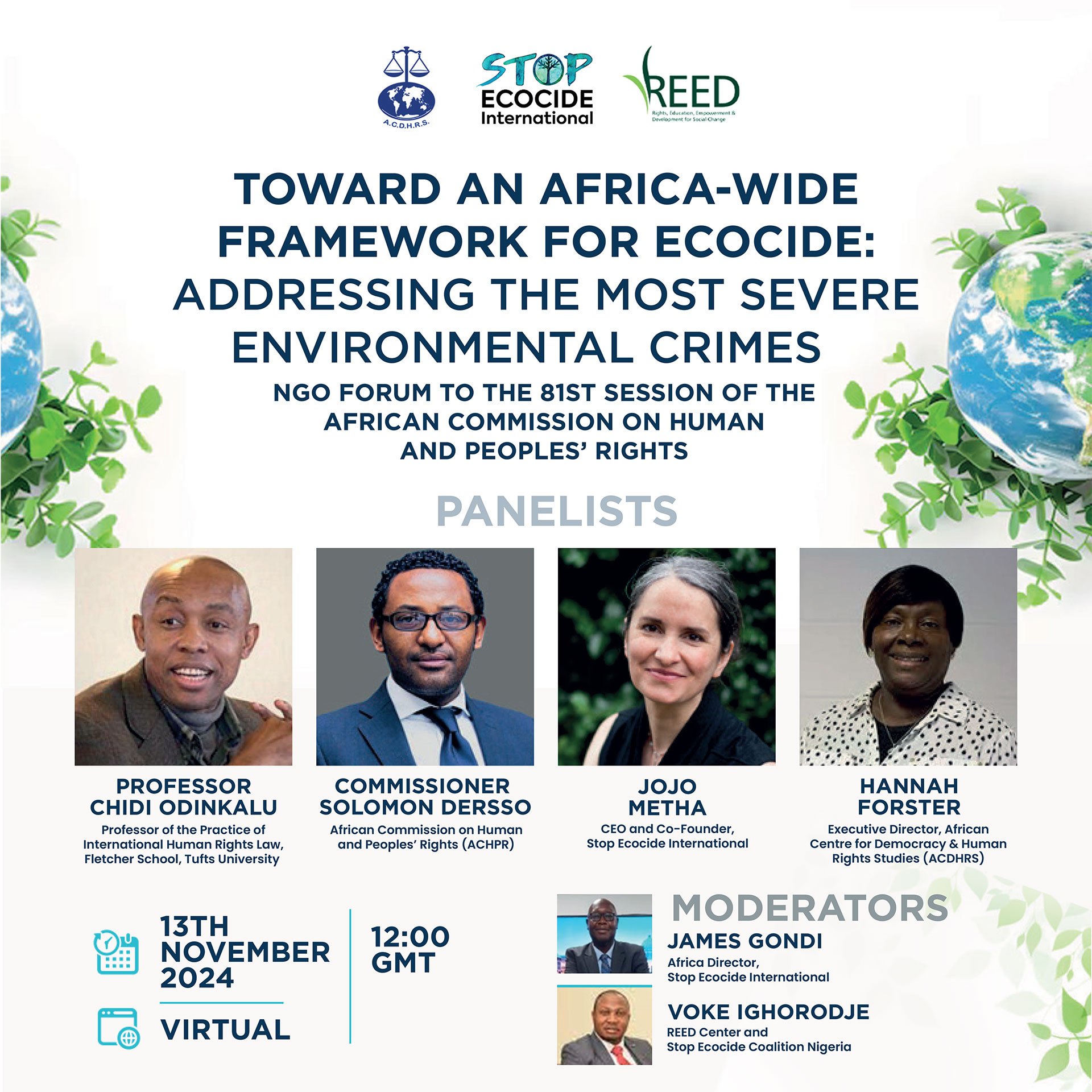
Toward an Africa-Wide Framework for Ecocide: Addressing the Most Severe Environmental Crimes
Toward an Africa-Wide Framework for Ecocide: Addressing the Most Severe Environmental Crimes
Time: 1200 GMT/ 1200 Nigeria / 1300 South Africa / 1400 Kenya
The African continent faces a myriad of environmental challenges, from deforestation and habitat destruction to pollution and climate change impacts. Despite numerous efforts to mitigate these issues, environmental crimes continue to pose significant threats to biodiversity, ecosystems, and human well-being. In response to this pressing issue, the concept of ecocide law has gained traction globally as a potential tool for holding individuals and corporations accountable for acts of environmental destruction. This webinar aims to explore the role of ecocide law in addressing environmental crime specifically within the African context. Our esteemed panel of experts will offer invaluable insights, share case studies, and propose actionable strategies to confront environmental degradation effectively.
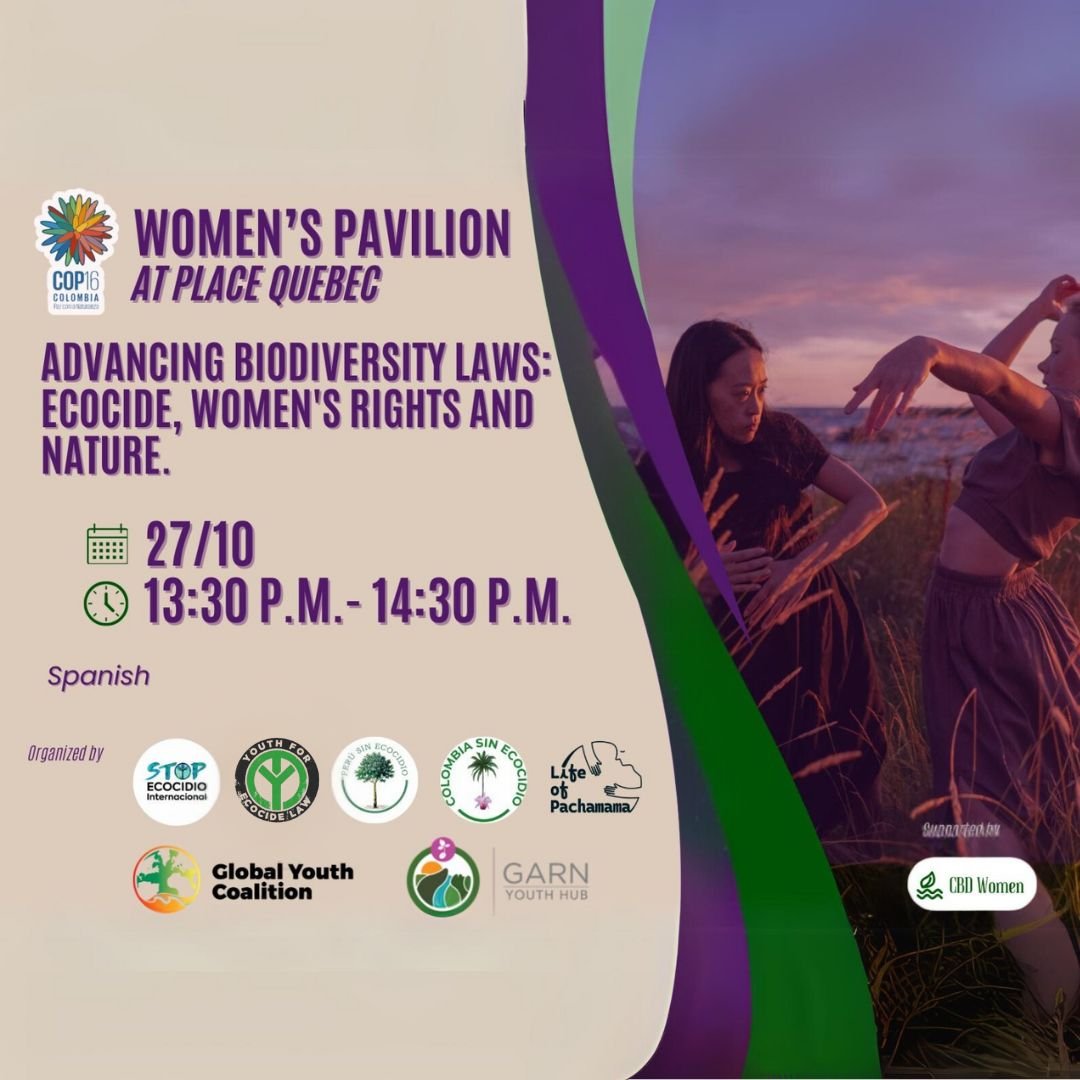

COP16 - Virtual - Engaging Ecocide Law as a mechanism for Climate Ambition
Biodiversity Law and Governance Day (BLGD) 2024 at CBD COP16 in Cali
Engaging Ecocide Law as a mechanism for Climate Ambition
Virtual panel: 26 October, 11:00 – 12:15 COT
By focusing on its potential to mitigate environmental destruction and engage cross-sector collaboration, an international ecocide law would serve as a tool for advancing climate ambition. How would this mechanism work in practice?
Participants will examine legal barriers, governance synergies, and strategies to strengthen capacity in implementing ecocide law, while also exploring its potential to drive stronger planning regulations and climate finance frameworks within and across sectors.
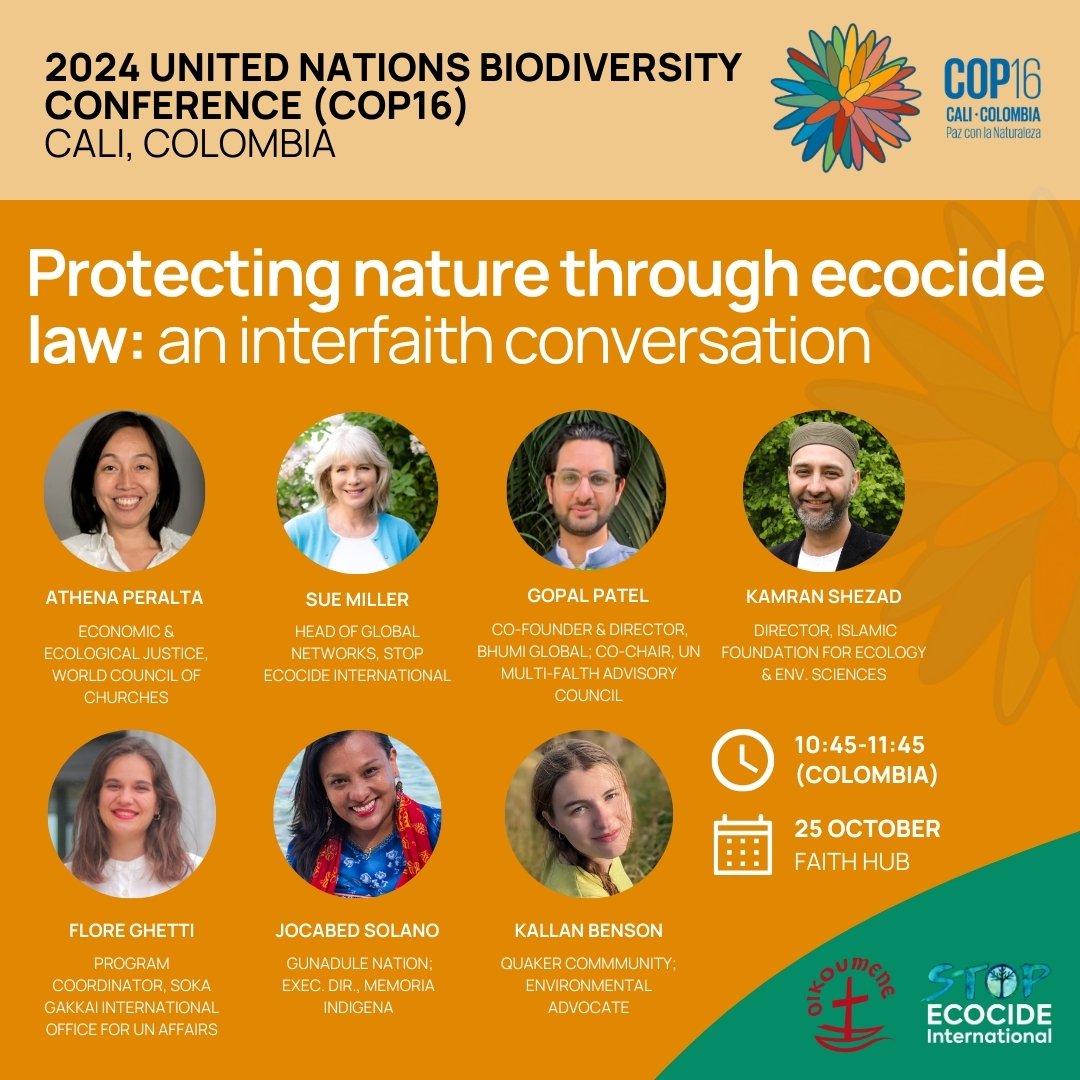
COP16 - BlueZone - Protecting nature through Ecocide Law: an interfaith conversation
Organised by Stop Ecocide International and World Council of Churches
10:45 at the Faith Pavilion
In 2022, Faith Voices for Ecocide Law, a volume of remarkable essays by faith leaders and indigenous wisdom keepers was published. The contributors examined the role of the natural world within their faith tradition and the necessary response to the huge damage humanity is causing. In September 2024, the Republic of Vanuatu. Fiji and Samoa submitted a proposal for a new international crime of ecocide for consideration by the members of the International Criminal Court, bringing closer the prospect of a powerful and effective deterrent to those behind the worst acts of environmental destruction. This event will consider how ecocide law can protect the natural world and explore how the world’s faiths can come together to help make this a reality.
Speakers:
Athena Peralta, World Council of Churches
Jojo Mehta, Co-Founder and CEO, Stop Ecocide International
Kamran Shazad, Director of the Islamic Foundation for Ecology and Environmental Sciences
Gopal Patel, Co-Founder and Director, Bhumi Global, Co-Chair of the UN Multi-falth Advisory Council and UN Decade Action Plan Challenge lead for Faith groups
Flore Ghetti, Programme Coordinator at the SGI Office for UN Affairs.
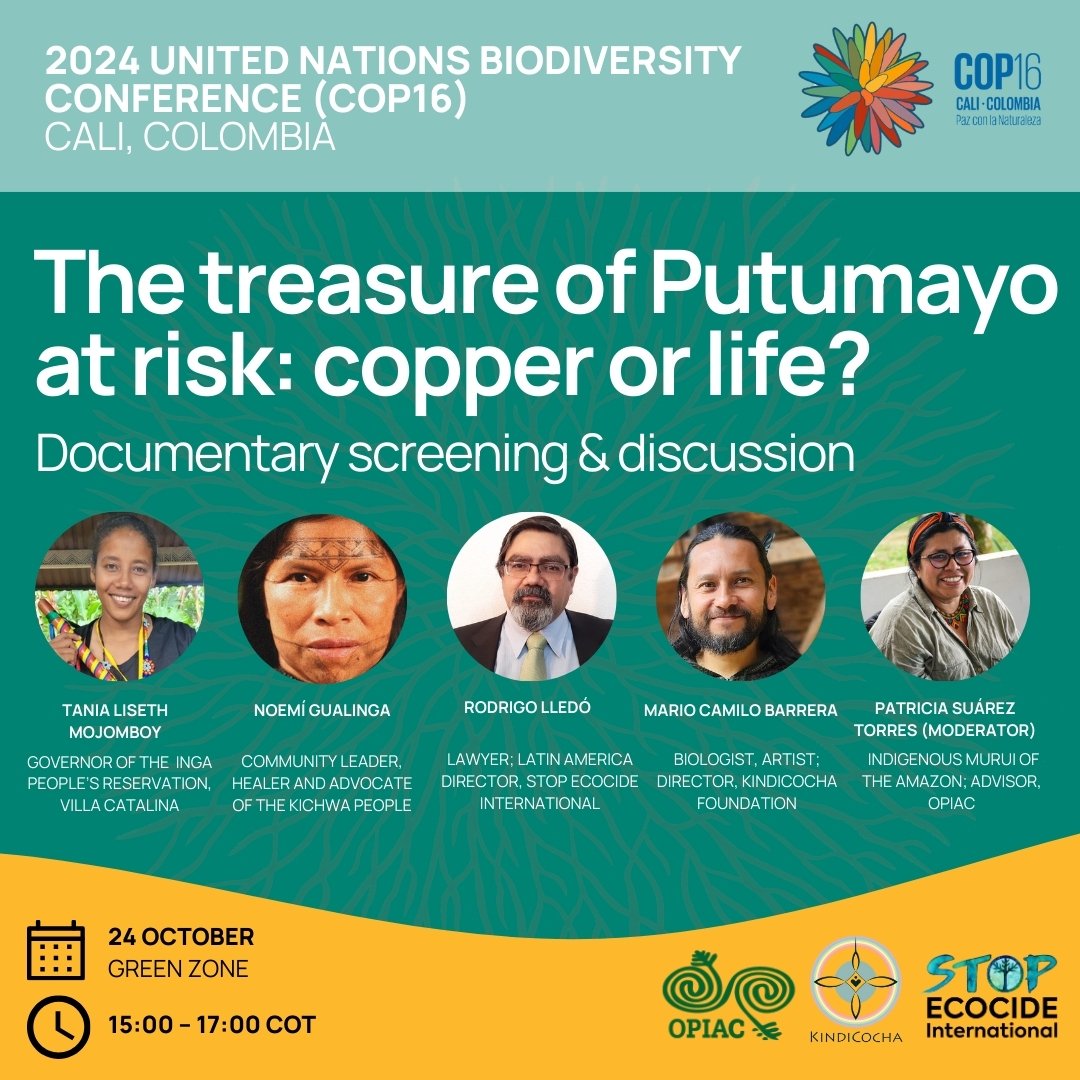
COP16 - In the Andean-Amazon Putumayo Documentary Screening
Organised by Stop Ecocide International and OPIAC
15:00 - 17:00 at Maloca OPIAC GZ
The documentary ‘In the Andean Amazonian Putumayo: Copper or Life’ (40') will be screened, followed by a talk by the speakers and a participatory open dialogue.
The Andean Amazonian Putumayo, one of South America's greatest natural treasures, is under threat if its mountains are opened up for intensive copper mining. Water from its mountains flows into the Amazonian watershed and feeds the region's great rivers across political boundaries.
The event will discuss the implications that mining activity would have on the ecosystem itself and on the entire Amazon basin, including the impact on the indigenous and non-indigenous populations that protect and care for the territory, whose livelihoods depend on this harmonious relationship with their surroundings. It will also address the issue of how sustainable management of this strategic Andes Amazon corridor in southern Colombia is possible, Finally, there will be a discussion on how an international crime of ecocide would serve to prevent serious damage to ecosystems, which could be irreparable, as is the case presented in the documentary.
Speakers:
Tania Liseth Mojomboy: Governor of the resguardo of the Inga people of Villa Catalina - Department of Putumayo.
Noemí Gualinga: Community leader, healer and activist of the Kichwa people of Sarayaku, in the Ecuadorian Amazon. She has held various leadership positions in the areas of health and education. She was President of the Sarayaku Women's Association and is a member of the Collective of Amazonian Women Defenders of the Forest.
Rodrigo Lledó: Lawyer, Director of Stop Ecocide for the Americas and vice-president of Human Rights Without Borders (DHSF). Former director of the Baltasar Garzón International Foundation and member of the Panel of Independent Experts for the Legal Definition of Ecocide.
Mario Camilo Barrera: Botanical biologist, artist and environmental leader. Director of the Kindicocha Foundation, Director of the Botanical Garden of Alto Putumayo, manager of Colibrí Amarillo essences of Andean-Amazonian orchids. and co-founder of the Dantakunapa Nature Reserve.
Short video intervention by Pau Soler, director of the documentary ‘In the Andean Amazonian Putumayo: Copper or life’.
Moderator: Patricia Suárez Torres, indigenous Murui of the Amazon, Technical Secretary of the Commission for the Protection of Peoples in Isolation, and Advisor to OPIAC. Defender of human rights and territorial rights. Professional in Social Work, Master in Sustainable Life Systems and Specialist in International Humanitarian Law.
Co-organisers: Stop Ecocide International, Kindicocha Foundation and OPIAC (National Organisation of Indigenous Peoples of the Colombian Amazon).
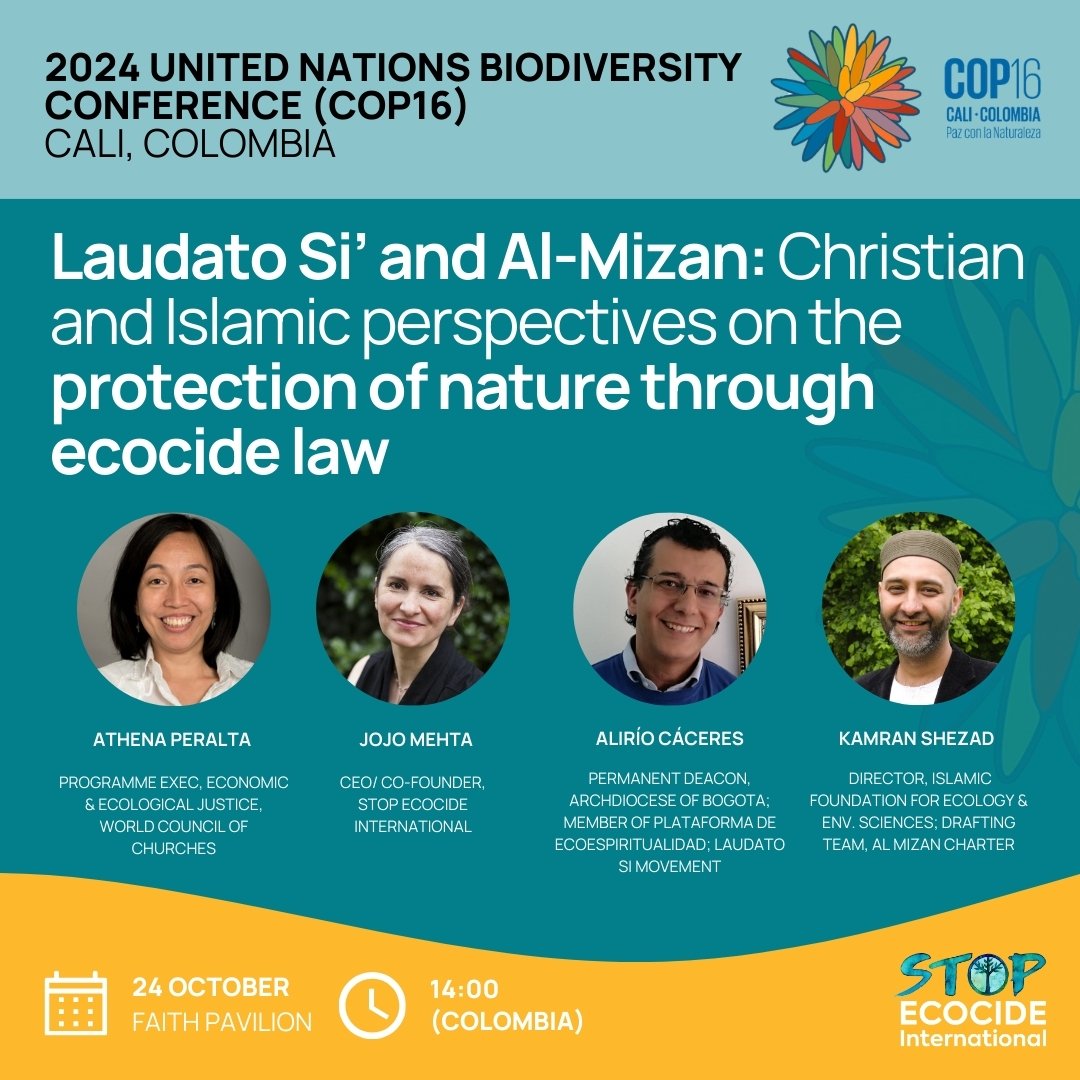
COP16 - BlueZone - Laudato Si’ and Al-Mizan: Christian and Islamic perspectives on the protection of nature through ecocide law
Organised by Stop Ecocide International
14:00 at the Faith Pavilion
Both Laudato Si’ and Al-Mizan: A Covenant for the Earth establish a comprehensive framework for ecological and moral responsibility, urging collective action for the protection of our planet and offering ideas and pledges for resolving the triple planetary crisis and, especially, the destruction of nature.
A dialogue between the two faiths about profound shared values has the potential to shift global consciousness and foster a powerful protection for the Earth. Ecocide Law would provide the necessary legal support for the task of transforming humanity’s relationship with nature from harm to harmony.
Speakers
Alirío Cáceres, permanent deacon of the archdiocese of Bogota and a member of Plataforma de Ecoespiritualidad, representing Laudato Si’ movement
Kamran Shezad, Director of the Islamic Foundation for Ecology & Environmental Sciences and part of the drafting team of Al-Mizan charter
Jojo Mehta, Co-Founder and CEO, Stop Ecocide International
Moderator: Athena Peralta, World Council of Churches































